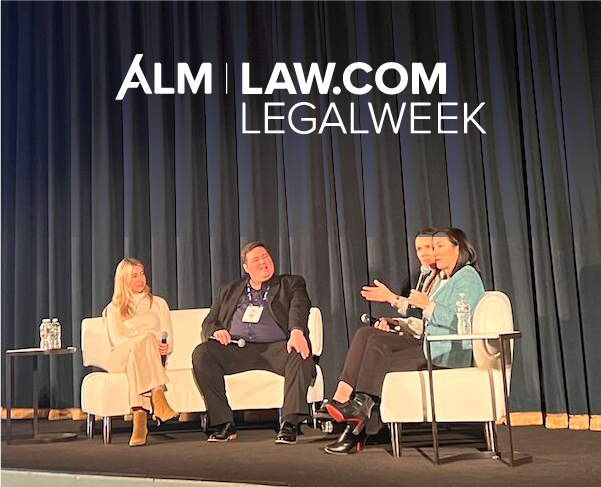
Blog
Legalweek 2024 Recap: How Industry Leaders are Creating AI-Powered Businesses
9 February 2024 | Eleanor Lightbody, CEO, Luminance
Last week, I was thrilled to be back in New York for the annual Legalweek conference. As usual, it was a round-the-clock week spent dashing between meetings with customers and journalists, showcasing Luminance’s latest features at a packed event stand, and wining and dining with legal leaders and innovators in the space.
This year, one of the highlights of my week was hosting a panel alongside three of Luminance’s customers. Adrian Lang, GC and Chief Privacy Officer at Staples Canada, David Den Herder, Associate GC at SiriusXM, and Juliana Rodrigues, Global Legal Director at AB InBev, joined me on-stage for a discussion of all things AI and innovation. And when I reflected on our discussion, it was interesting to dissect the different factors driving technology adoption in the current landscape. So, in case you missed it, here are some of my main takeaways from the session…
Improved Commercial Insight
Knowledge is at the core of any business. As companies enter into contracts left, right and centre, it can be hard to keep track of all the obligations, expiry dates and key information contained in them. What’s more, often this information – which is fundamental to how a business makes strategic decisions – is kept in personal folders, emails, or in the mind of personnel who might leave the company. So, using technology to centralise and immortalise institutional knowledge is key, offering a holistic overview of activities and contractual data across any business.
David noted that Luminance’s AI-powered repository has been an important tool for SiriusXM in this sense. The visual representation of commercial insights instils confidence in employees that they’re aware of all company activities. This could be thanks to outliers being flagged early on, or alerts reminding you of important upcoming dates. As David said, “If one of the executives comes to you with questions, you know you can have an informed discussion on the big picture.”
Giving Non-Legal Teams Autonomy
Whilst the focus of Legalweek lies in the name, our panellists gave some interesting insight into the ways that non-legal teams are also benefitting from AI. Any business function deals with contracts and legal documents nearly every day. That could be Sales teams needing to get an NDA signed as soon as possible to capitalise on momentum with a prospect, or a member of the Procurement team needing to square away a Supplier Agreement. Think how much more efficiently these teams could run if they weren’t fully dependent on the legal department, especially when most of these documents are highly standardised.
Addressing the audience, Adrian pointed out Luminance’s potential here, since “anyone who’s touching an agreement or contract can be interfacing with Luminance directly on some level”. But how exactly can AI be accessible and useful to non-legal professionals you might ask? Well, for example, Adrian explained how ‘Ask Lumi’, Luminance’s ‘legal-grade’ chatbot, has been particularly helpful in enabling them to manage their own documents. She explained, “With Ask Lumi, you can type in ‘What are the clauses with auto-renewals in the next six months?’, and it will bring up all your contracts”. ‘Ask Lumi’ will respond to any question about any contract, so there’s no need to go through Legal to get the answers. Of course, by empowering non-legal teams in this way, the legal department has more time to focus on complex, higher-value tasks.
Doing More with Less
AI is a gamechanger in terms of managing increasing workloads, meaning it can help businesses to grow sustainably. Let’s say your business is scaling rapidly. This will likely translate to a significant increase in the quantity of documents you’re dealing with. Whilst in the past this may have induced panic upon realising you need significantly more resource, with AI, it can easily scale with you. You can just upload a larger volume of contracts which the tech will manage for you. By overcoming these logistical restrictions, businesses are much freer to experiment and take risks, which is an exciting opportunity.
Juliana explained that Luminance was an important tool in AB InBev’s expansion: “Bringing Luminance in gave us the comfort that we can confidently scale with the same or even better levels of response and knowledge retention”. Indeed, the ability of AI to manage any volume of work offers companies unfounded levels of flexibility.